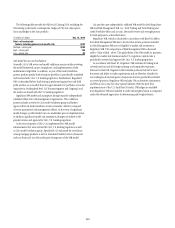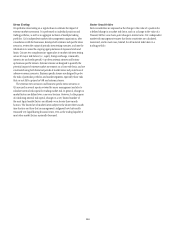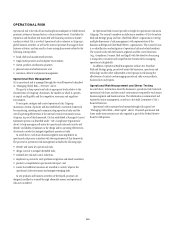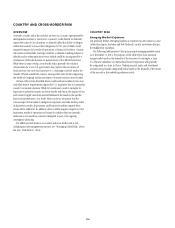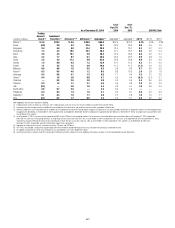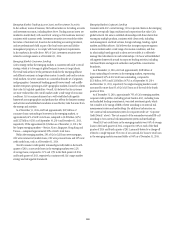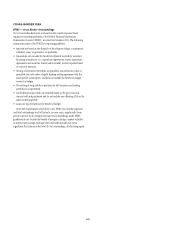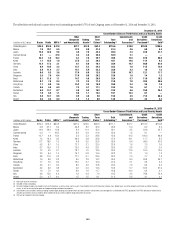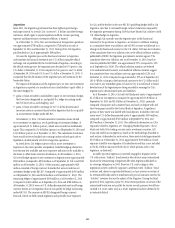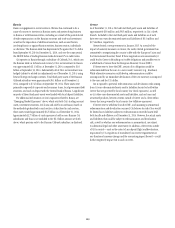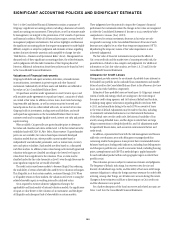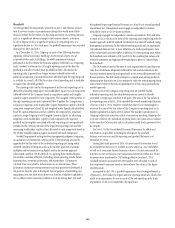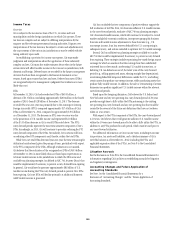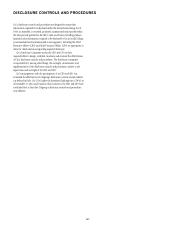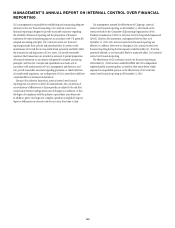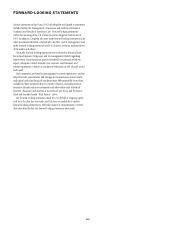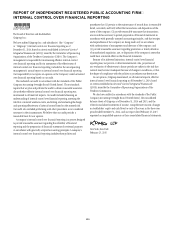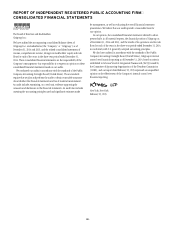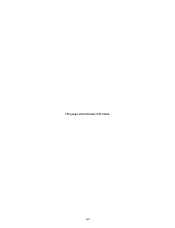Citibank 2014 Annual Report Download - page 139
Download and view the complete annual report
Please find page 139 of the 2014 Citibank annual report below. You can navigate through the pages in the report by either clicking on the pages listed below, or by using the keyword search tool below to find specific information within the annual report.122
The ongoing economic and political situation in Argentina could
negatively impact Citi’s results of operations, including revenues in its foreign
exchange business and/or potentially increase its funding costs. It could
also lead to further governmental intervention or regulatory restrictions
on foreign investments in Argentina, including further devaluation of the
Argentine peso, further limits to foreign currency holdings or hedging
activities, or the potential redenomination of certain U.S. dollar assets and
liabilities into Argentine pesos, which could be accompanied by a devaluation
of the Argentine peso. In addition, in January 2015, U.S. regulators informed
Citi of its decision to downgrade Argentina’s transfer risk rating, which will
result in mandatory transfer risk reserve requirements to be recognized in the
first quarter of 2015.
Further, as widely reported, Citi acts as a custodian in Argentina for
certain of the restructured bonds that are part of the “holdout” bond
litigation; specifically, U.S. dollar denominated restructured bonds governed
by Argentina law and payable in Argentina. During the third quarter of 2014,
the U.S. court overseeing the Argentina litigation ruled that Citi Argentina’s
payment of interest on these bonds, as custodian, was covered by the court’s
order and thus could not be made without violating the order prohibiting the
payments. While the court has granted a stay and permitted Citi Argentina
to make the required 2014 interest payments, future interest payments on
these bonds could place Citi Argentina in violation of the court’s order, absent
relief from the court. Conversely, Citi Argentina’s failure to pay future interest
on these bonds could result in significant negative consequences to Citi’s
franchise in Argentina, including sanctions, confiscation of assets, criminal
charges, or even loss of licenses in Argentina, as well as expose Citi and Citi
Argentina to litigation. The next interest payment on the bonds for which Citi
Argentina serves as custodian is due March 31, 2015.
Venezuela
Since 2003, the Venezuelan government has implemented and operated
restrictive foreign exchange controls. These exchange controls have limited
Citi’s ability to obtain U.S. dollars in Venezuela; Citi has not been able to
acquire U.S. dollars from the Venezuelan government since 2008.
As of December 31, 2014, the Venezuelan government operates three
separate official foreign exchange rates:
• thepreferentialforeignexchangerateofferedbytheNationalCenterfor
Foreign Trade (CENCOEX), fixed at 6.3 bolivars to one U.S. dollar;
• theSICADIrate,whichwas12bolivarstooneU.S.dollar;and
• beginninginthesecondquarterof2014,theSICADIIrate,whichwas50
bolivars to one U.S. dollar.
On February 10, 2015, the Venezuelan government published changes
to its foreign exchange controls, which continue to maintain a three-tiered
system. The new exchange controls maintain the CENCOEX rate at 6.3
bolivars per U.S. dollar; however, the new exchange controls merge SICAD II
into SICAD I, which will be referred to as “SICAD.” The SICAD auctions will
begin at 12 bolivars per U.S. dollar and are expected to devalue progressively
in the future. In addition, the new exchange controls establish the Marginal
Foreign Exchange System (SIMADI), which is intended to be a free floating
exchange. The SIMADI exchange limits the volume of foreign currency that
companies can purchase each month, and banks and brokers, which include
Citi, are prohibited from accessing this market for their own needs.
Citi uses the U.S. dollar as the functional currency for its operations in
Venezuela. As of December 31, 2014, Citi uses the SICAD I rate to remeasure
its net bolivar-denominated monetary assets as the SICAD I rate is the only
rate at which Citi is legally eligible to acquire U.S. dollars from CENCOEX,
despite the limited availability of U.S. dollars and although the SICAD I
rate may not necessarily be reflective of economic reality. Re-measurement
of Citi’s bolivar-denominated assets and liabilities due to changes in the
exchange rate is recorded in earnings. Further devaluation in the SICAD I
exchange rate, a change by Citi to a less favorable rate or other changes to
the foreign exchange mechanisms would result in foreign exchange losses in
the period in which such devaluation or changes occur.
At December 31, 2014, Citi’s net investment in its Venezuelan operations
was approximately $180 million (unchanged from September 30, 2014
and compared to $240 million at December 31, 2013), which included
net monetary assets denominated in Venezuelan bolivars of approximately
$140 million (compared to approximately $130 million at September 30,
2014 and $220 million at December 31, 2013). Total third-party assets of
Citi Venezuela were approximately $900 million at December 31, 2014
(unchanged from September 30, 2014 and a decrease from $1.2 billion as of
December 31, 2013), primarily composed of cash on deposit with the Central
Bank of Venezuela, corporate and consumer loans, and government bonds. A
significant portion of these assets was funded with local deposits.


